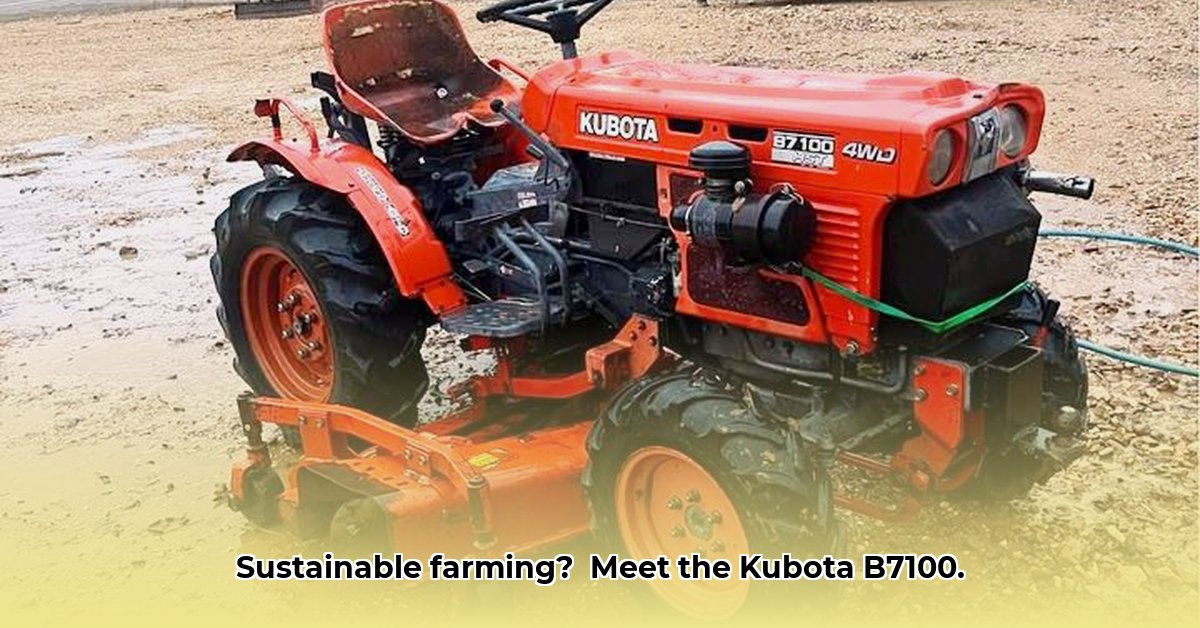
The Kubota B7100, a compact tractor produced from 1976 to 1985, presents a compelling case study in sustainable agriculture. This article investigates whether this vintage machine can contribute to environmentally conscious farming practices, acknowledging both its potential and limitations. For more information on Kubota tractors, see this helpful resource: Kubota Tractor Info.
A Vintage Approach to Modern Sustainability
The B7100's design, predating the current emphasis on sustainable agriculture, inadvertently aligns with certain environmentally friendly principles. Its compact size and relatively low power output suggest potential benefits in fuel efficiency and reduced environmental impact compared to modern, high-powered tractors. However, a thorough evaluation requires detailed analysis across multiple aspects of the tractor's lifecycle.
Fuel Efficiency: A Deeper Dive
The B7100's three-cylinder diesel engine is inherently more fuel-efficient than larger, multi-cylinder engines. But how much more economical is it in practice? While anecdotal evidence suggests lower fuel consumption, precise data remains scarce. A comprehensive study comparing its fuel use per acre cultivated to both newer, smaller tractors and larger models is needed to definitively quantify this advantage. This research should consider variations in terrain, workload, and operating conditions.
Maintenance and Repair: Simplicity and Challenges
The B7100's simple mechanical design simplifies maintenance and repair, potentially reducing reliance on expensive specialized mechanics. However, the age of the machine poses challenges. Parts availability can be problematic, requiring resourcefulness from farmers. The formation of community-based repair networks, sharing parts and expertise, could greatly mitigate this limitation, mirroring the successful models observed in other sectors relying on vintage equipment. This collaborative approach strengthens both the economic and environmental sustainability of using the B7100.
Adaptability and Niche Applications
The B7100’s compact size and versatility shine in specific contexts. Small farms, permaculture projects, and other niche applications benefit significantly from its maneuverability and suitability for diverse tasks. Its agility allows for precise work in tight spaces, minimizing soil compaction and promoting healthier ecosystems. What specific adaptations or modifications further enhance the B7100’s suitability for these contexts? Further investigation into this area could illuminate additional sustainable applications.
Environmental Impact: The Need for a Lifecycle Assessment
While the B7100's potential for lower fuel consumption during operation is promising, a complete picture of its environmental impact demands a comprehensive lifecycle assessment (LCA). This assessment must encompass manufacturing processes, material sourcing, operational emissions, and end-of-life management. The lack of a readily available LCA currently limits our definitive assessment of its long-term sustainability. Can the data be gathered to undertake such a study? This crucial step would illuminate the B7100’s overall contribution to environmental sustainability.
Discussion: Weighing the Evidence
The potential of the Kubota B7100 for sustainable agriculture is promising but requires further investigation. Its inherent fuel efficiency and simple design offer benefits, but finding parts and performing a full lifecycle assessment remain crucial hurdles. The absence of readily available comprehensive data significantly impacts our ability to draw definitive conclusions.
Conclusion: Actionable Steps for a Sustainable Future
The Kubota B7100 holds potential within specific sustainable agricultural contexts, particularly small-scale operations. While its simplicity and potential fuel efficiency are attractive, a comprehensive lifecycle assessment is necessary to fully evaluate its long-term environmental impact. Actionable steps include:
- Farmer Collaboration: Establish community-based repair networks to improve parts accessibility and reduce reliance on commercial sources.
- Research Initiatives: Fund research to quantify fuel efficiency and conduct a full lifecycle assessment of the B7100. This comparison should include both modern tractors of similar size and larger, more powerful models.
- Policy Support: Develop policies that incentivize the use and refurbishment of vintage agricultural equipment, promoting sustainable practices.
By addressing these key areas, we can unlock the full potential of the Kubota B7100 as a valuable component of a more sustainable agricultural future.